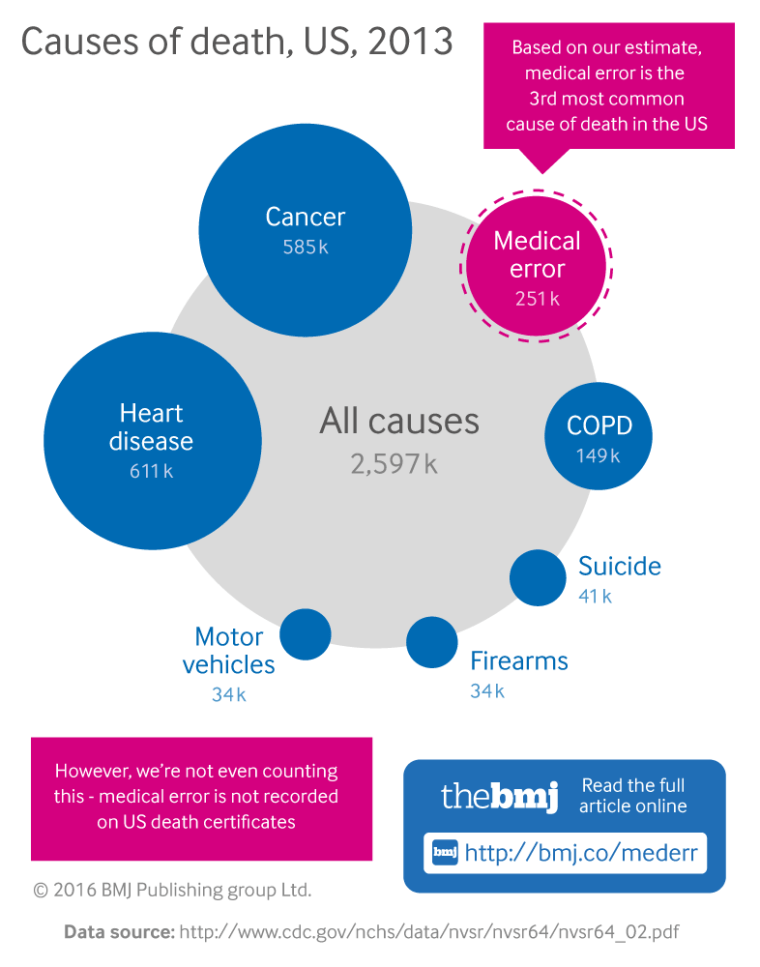By Maggie Fox and Lauren Dunn, for NBC News.
Medical mistakes — from surgical disasters to accidental drug overdoses — are the No. 3 cause of death in the U.S., behind cancer and heart disease, two experts argued Wednesday.
They said a careful count of all deaths from preventable medical errors shows between 200,000 and 400,000 people a year die in the U.S. from these mistakes. The only way to get the country to do something about them is to start counting them, Dr. Martin Makary and Michael Daniel of Johns Hopkins University medical school argued.
“If medical error was a disease, it would rank as the third leading cause of death in the U.S.,” they wrote in an analysis published in the British Medical Journal’s online publication The BMJ.
Cancer and heart disease are neck and neck as the top cause of death in the United States. In 2012, 24 percent of all deaths were from heart disease — 599,711 to be precise. And 582,623 deaths, or 23 percent of the total, were from cancer.
Number three, according to the Centers for Disease Control and Prevention, is chronic obstructive pulmonary disease or COPD, with 149,000 deaths. Makary’s estimate of 250,000 deaths a year would top that.
“We spend a lot of money on cancer and heart disease but we have not even recognized that medical error is the third leading cause of death in the United States,” Makary told NBC News.
“We spend a lot of money on cancer and heart disease but we have not even recognized that medical error is the third leading cause of death in the United States.”
“We have not as a country recognized the endemic problem of people dying from the care that they receive rather than the illness or injury for which they seek care.”
Health policy experts and many doctors have been trying to call attention to the problem of medical errors for more than a decade. In 1999 the Institute of Medicine released a landmark report estimating that as many as 98,000 people died every year from medical errors.
Since then, other studies have put the number as high as 400,000 a year.
One problem is that errors are not usually put down on death certificates, said Makary, who’s been helping lead the movement to disclose and prevent medical mistakes.

“Our national health statistics puts out a list of most common causes of death in the United States each year. That list is a big deal. It informs all of our research funding priorities and all of our public health campaigns.”
That list is called the International Classification of Disease (ICD) code. “The medical coding system was designed to maximize billing for physician services, not to collect national health statistics, as it is currently being used,” Makary said.
He and Daniel used four studies that analyzed medical death rate data from 2000 to 2008, including one by the U.S. Department of Health and Human Services’ Office of the Inspector General and the Agency for Healthcare Research and Quality.
They came up with an estimate of 250,000 deaths a year from medical errors.
“That places it well above the current number three cause of death even using the lowest estimate,” Makary said.
“I see it almost every day in the hospital.”
These mistakes are well documented, but hard to pin down. They include infections caught in the hospital, surgical errors, and a lack of follow-up.
“I see it almost every day in the hospital, some complication, somebody who’s admitted to the hospital, somebody’s who’s either severely disabled or occasionally even people who die from medical errors,” said Ashish Jha, a professor of health policy at the Harvard TH Chan School of Public Health.
“When I look at this number of 250,000, it rings true for me. I think it’s a real number, and it matches what I see in hospitals every day,” Jha told NBC News.
“You know hospitals are really busy places, so this is not about doctors or nurses not being careful. I find most physicians, most nurses, are extremely diligent, hard-working, trying to do the right thing.”
But sometimes a patient is given the wrong prescription, or the wrong dose of a drug, or sent home without someone making sure they have an important follow-up appointment. Sometimes a surgeon nicks an artery and a patient bleeds to death.
“Patients falling through the cracks, patients discharged without adequate instructions on where to go to next, patients who we know are non-compliant with their medication continuing to be non-compliant while we have a disconnect with their medical system,” Makary added.
Blaming doctors, nurses or administrators is not the goal, Makary said.
“Human error will always be in medicine and we will never get rid of human error but we can design systems to mitigate the impact and reduce the frequency of human error,” he said.
The Institute of Medicine called for a culture of confession in its 1998 report on medical errors.
Exposing the errors and admitting to them can help hospitals do a better job of preventing them the next time, Makary argued.
“Not all complications are preventable. In this analysis we look specifically at complications that were considered preventable because substandard care was administered,” he said.
It fits in with what other research has found.
A report last year found that most Americans will get a wrong or late diagnosis in their lifetimes.
The federal government’s been working on this and said in 2014 that hospitals are making fewer mistakes.

